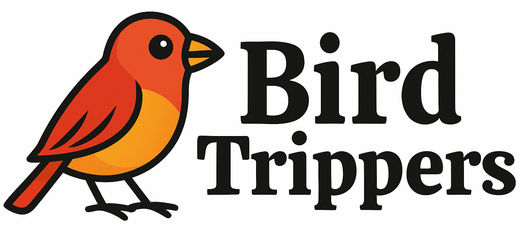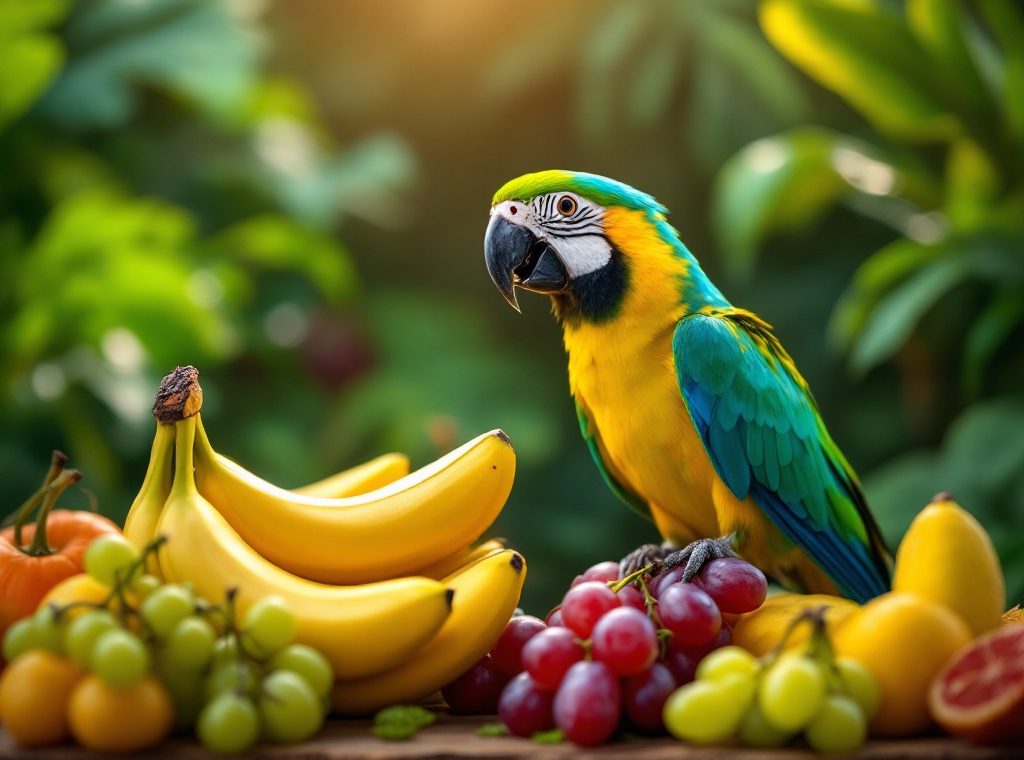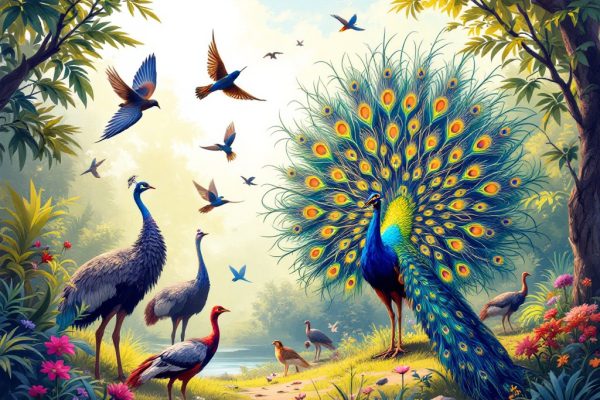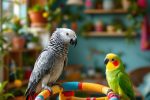Can Parrots Eat Bananas, Grapes, and Other Fruit
Want a vibrant, healthy parrot? Discover the delicious world of feeding your feathered friend fruits like bananas and grapes! Learn about their nutritional benefits, safe serving sizes, and other healthy fruit options. This guide provides practical tips for preparing and incorporating fruits into a balanced parrot diet, ensuring your companion thrives. Explore now and give your parrot the gift of a delicious, healthy life!
Important information
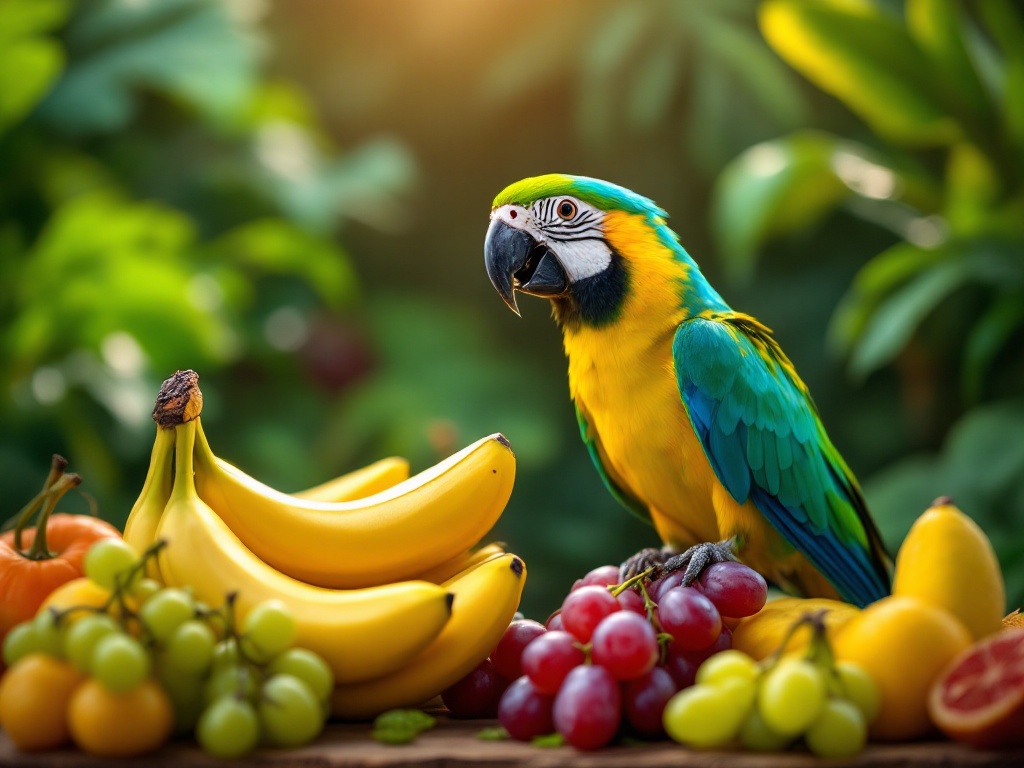
- Parrots can eat a variety of fruits like bananas, grapes, apples, pears, berries, mangoes, and papayas, but these should be given in moderation due to their sugar content.
- Always wash fruits thoroughly to remove pesticides and remove seeds and pits to prevent choking hazards and toxicity.
- A parrot’s diet should primarily consist of high-quality pellets, supplemented by fresh vegetables, and a small amount of fruit.
- Offer fruits in bite-sized pieces, and for non-organic produce like bananas and apples, peeling is recommended.
- Avoid feeding parrots avocados, apple seeds, cherry seeds, or the pits of stone fruits like peaches and plums, as these are toxic.
Can Parrots Eat Bananas, Grapes, and Other Fruit?
Parrots thrive on a diverse diet of fruits. Some excellent choices include bananas, rich in potassium, vitamin C, and fiber, and grapes, which offer vitamins A and C and essential hydration. Other safe and healthy fruits are apples, pears, berries, mangoes, and papayas. While fruit is crucial for a parrot’s health, feed it in moderation due to its sugar content. Always remove seeds and pits to prevent choking hazards.
Benefits of Bananas for Parrots
- rich source of potassium, vital for muscle function,
- packed with vitamin C, an antioxidant that supports the immune system,
- good source of fiber, essential for digestive health.
Benefits of Grapes for Parrots
- provide vitamins A and C, important for vision and immune function,
- high water content helps maintain hydration,
- can be a refreshing treat during warmer months.
Remember, a balanced diet with a variety of fruits, vegetables, and a high-quality parrot pellet ensures a happy and healthy companion.
Understanding Parrots’ Dietary Needs
Maintaining a varied diet is crucial for a parrot’s health. This includes pellets, seeds, fruits, and vegetables. Fruits are vital, providing essential vitamins and minerals. Offer sugary fruits like bananas and grapes sparingly. Always wash fruits thoroughly to remove pesticides before cutting them into bite-sized pieces for your parrot.
Importance of Variety in a Parrot’s Diet
A diverse diet is crucial for parrots, providing essential nutrients like vitamins, minerals, and antioxidants. Fruits, vegetables, and pellets should form the foundation of their meals, supplemented by a small quantity of seeds. Variety isn’t just about nutrition; it also keeps parrots engaged with their food, reducing boredom and promoting psychological well-being. This diverse approach prevents deficiencies, supports a healthy immune system, and ultimately contributes to a long, vibrant life. A balanced parrot diet should include:
- Fruits, such as apples, bananas, and berries,
- Vegetables, like carrots, broccoli, and leafy greens,
- High-quality pellets, formulated specifically for parrots,
- A small amount of seeds as a treat.
Feeding Guidelines for Parrots
Bananas and grapes can be a delightful treat for parrots, but moderation is key. These sweet fruits should be offered sparingly due to their sugar content. A parrot’s diet should primarily consist of pellets, vegetables, and other nutritious foods. Careful portion control helps prevent nutritional imbalances and maintains overall health. Always wash fruits thoroughly to remove pesticide residue, and remember to remove seeds and pits before serving. Offer fruit in various appealing ways: fresh, sliced, diced, or even on a skewer.
Safe Fruits
- apples (without seeds),
- berries,
- melons,
- peeled oranges,
- mangoes.
Safe Vegetables
- leafy greens,
- carrots,
- broccoli,
- bell peppers.
Offer bananas and grapes a few times a week, not daily. These fruits should be a supplementary treat, not a staple due to their high sugar content.
Observe your parrot’s reaction to different fruits and adjust the amounts accordingly. Sensible portions help prevent obesity and other health issues.
Never feed your parrot avocado, apple seeds, cherry seeds, or the pits of stone fruits like peaches and plums. These contain toxins harmful to parrots.
A diverse diet ensures balanced nutrition and keeps parrots engaged with their meals.
Moderation and Portion Sizes
Parrots love fruits like bananas and grapes, but it’s important to offer them in moderation. Small portions are key, treating fruit as a tasty supplement, not the main course. Overindulgence can lead to health issues and dietary imbalances. A balanced and varied diet is essential, with fruit as a delicious addition, not the primary component.
Safe Fruits and Vegetables for Parrots
Parrots enjoy a wide selection of fruits and vegetables as part of a healthy diet.
Fruits
- Apples,
- Bananas,
- Berries (strawberries, blueberries, raspberries),
- Cantaloupe,
- Pitted cherries,
- Cranberries,
- Grapes,
- Kiwi,
- Mango,
- Melons (watermelon, honeydew),
- Oranges,
- Papaya,
- Peaches,
- Pears,
- Pineapple,
- Plums (pit removed),
- Pomegranates.
Vegetables
- Asparagus,
- Beets,
- Broccoli,
- Carrots,
- Corn on the cob,
- Green beans,
- Peas in the pod,
- Peppers (seeds removed),
- Pumpkin,
- Squash,
- Sweet potatoes,
- Yams.
Remember to thoroughly wash all produce and remove any seeds or pits before giving it to your parrot.
Fruits to Avoid Giving Your Parrot
Avocados are toxic to parrots and should never be included in their diet. Citrus fruits, such as oranges, lemons, and limes, can cause digestive upset.
- apple,
- apricot,
- cherry,
- peach.
Their pits and seeds contain harmful compounds and must be removed before feeding them to your bird. A carefully chosen diet is essential for your parrot’s well-being.
Remove pits and seeds from:
- apples,
- peaches,
- cherries,
- apricots.
Are Bananas Good for Parrots?
Parrots enjoy bananas as a healthy treat, benefiting from their rich potassium and vitamin B6 content, which are essential for their well-being. However, due to the high sugar levels, offer bananas in moderation. Always peel the fruit first to remove any lingering pesticides.
Nutritional Value of Bananas
Fuel your body with a banana! This nutritious fruit provides vitamin B6 for healthy nerves, potassium for strong muscles, and fiber for smooth digestion. It’s the perfect healthy snack.
Benefits of Feeding Bananas to Parrots
Bananas offer several health benefits for parrots. They are a good source of potassium, which is important for healthy nerve and muscle function. Bananas also provide vitamin B6, which supports brain health, and vitamin C, an antioxidant that strengthens the immune system. Additionally, the fiber in bananas aids digestion.
Risks of Overfeeding Bananas
While bananas offer a sweet treat, too many can negatively impact a parrot’s health, potentially leading to obesity or diabetes, among other issues. A balanced diet rich in various fruits and vegetables is crucial for their well-being. For personalized guidance, consult an avian veterinarian who can provide specific dietary recommendations.
Are Grapes Safe for Parrots?
Grapes are a nutritious and hydrating snack for parrots, rich in vitamins K and C. However, moderation is key. Always wash grapes thoroughly to remove pesticides before offering them to your parrot. Cut grapes into smaller pieces to prevent choking, especially for smaller birds. Introduce grapes gradually and monitor your parrot for any reactions.
- nutritious and hydrating snack,
- rich in vitamins K and C,
- practice moderation.
Wash the grapes thoroughly to remove any pesticides.
Cut the grapes into smaller pieces to prevent choking hazards.
Introduce grapes gradually into your parrot’s diet.
Monitor your parrot for any adverse reactions.
Nutritional Information of Grapes
- grapes are rich in vitamin C, which boosts a parrot’s immune system.
- they contain vitamin K, essential for proper blood clotting.
- potassium in grapes helps regulate blood pressure and supports muscle function.
- the B vitamins present in grapes contribute to energy production.
Benefits of Grapes for Parrots’ Health
Grapes are a refreshing and hydrating snack for parrots due to their high water content. They are rich in vitamins A, C, and K, as well as immune-boosting antioxidants. While grapes offer several benefits, feed them in moderation because of their sugar content. Always wash grapes thoroughly to remove pesticides. For smaller birds, cut grapes into halves or quarters to prevent choking hazards.
Potential Risks of Feeding Grapes
While grapes can be a tasty treat for your parrot, too many can lead to weight gain due to their high sugar content, which adds extra calories. Overfeeding grapes might displace other nutritious foods in their diet, causing potential nutrient deficiencies. A balanced diet is crucial for their health. Therefore, moderation is key when offering grapes as a treat.
Nutritional Benefits of Other Fruits for Parrots
From apples and pears to berries, mangoes, and papayas, fruits offer a wealth of vitamins and minerals, including fiber (especially in apples) and antioxidants (abundant in berries). These nutrients are essential for maintaining good health. Fruits also contribute to hydration due to their high water content, which aids digestion and promotes regularity.
While fruit is beneficial, it’s important to remember that it contains natural sugars. Moderation is key to prevent weight gain. For instance, excessive fruit juice consumption can contribute to obesity. Therefore, enjoy fruit as part of a balanced diet, opting for whole fruits over juices to maximize fiber intake and minimize the impact of sugar.
Vitamins and Minerals in Fruits
Vitamin A promotes healthy vision.
B vitamins ensure proper metabolism.
Calcium supports strong bones.
Vitamin C boosts the immune system.
Potassium regulates fluid balance.
Iron is crucial for red blood cell production.
These essential vitamins and minerals from fruits contribute significantly to a parrot’s overall health.
Hydrating and Digestibility Factors
Fruits are an excellent source of hydration for parrots because many are packed with water crucial for their health. Melons and berries are particularly easy to digest, providing a quick boost of energy and vital nutrients. While digestion rates vary, with apples being easier to process than some others, the fiber in fruit generally aids a parrot’s digestive system.
High Sugar Content and Weight Management
Parrots love sweet fruits like bananas and grapes, but these treats should be given in moderation. A balanced diet is essential for their well-being, as too much sugar can cause obesity and other health issues. Limiting sugary fruits helps your parrot stay fit and healthy.
Practical Tips for Feeding Parrots Fresh Fruits
Thoroughly wash fruits to eliminate pesticides and dirt.
For non-organic produce like bananas and apples, peeling is recommended as the skin might contain harmful chemicals.
Cut the fruit into bite-sized pieces appropriate for your parrot to prevent choking.
Remove seeds and pits, which pose both toxicity and choking risks.
Offer a diverse selection of fresh, ripe fruits to ensure balanced nutrition and keep your parrot engaged.
Skewers can add an element of fun.
Fruit should supplement a balanced diet consisting of pellets, vegetables, and other healthy options.
Presentation and Preparation Tips
Parrots enjoy their fruit best when it’s served in small, manageable pieces, making it easier for them to grasp and eat. This simple preparation promotes healthy eating habits and a more enjoyable mealtime experience.
Organic and Non-toxic Options
Prioritize organic fruits to minimize your parrot’s pesticide exposure. Even organic produce should be washed, however, to remove any surface contaminants. Avoid feeding your parrot fruit from plants treated with chemicals like insecticides and herbicides, as these can be toxic. Here’s a safe fruit guide for your parrot:
- Apples: offer a variety of nutrients, but remove seeds and core which contain cyanide, a toxic substance.
- Bananas: a good source of potassium and other essential vitamins, offer in moderation.
- Berries (strawberries, blueberries, raspberries): packed with antioxidants and vitamins, wash thoroughly before serving.
- Mango: rich in vitamins A and C, remove the skin and pit before offering to your parrot.
- Oranges: a great source of vitamin C, offer segments without the peel or seeds.
- Grapes: offer seedless varieties in moderation, as they can be high in sugar.
- Papaya: rich in vitamins A and C, remove seeds before serving.
- Pineapple: remove the skin and core as they are tough for parrots to digest.
- Watermelon: a hydrating treat, offer small pieces without the rind and seeds.
Balancing Fruits with Other Dietary Components
A healthy parrot thrives on a balanced diet. Base this diet on high-quality pellets, supplemented with fresh vegetables. A small serving of fruit is a good addition, but remember that while fruit offers vitamins and minerals, it’s also sugary, so keep portions small. Seeds and nuts make great occasional treats, but shouldn’t be a major part of the diet. Prioritize a nutritionally balanced approach. Here’s a helpful guideline:
- Pellets: should make up the majority of your parrot’s diet, providing essential nutrients.
- Fresh Vegetables: offer vital vitamins and minerals, promoting overall health. Leafy greens, carrots, and broccoli are excellent choices.
- Fruits: provide additional vitamins and minerals but should be given in moderation due to their sugar content. Berries and melons are good options.
- Seeds and Nuts: offer healthy fats and protein but should be limited as occasional treats due to their high calorie content.
